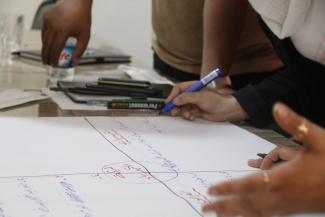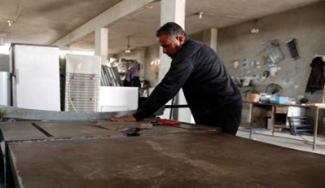Eleven years of bitter conflict, coupled with the impacts of the COVID-19 pandemic and dire economic conditions, have made employment opportunities in northeast Syria few and far between. This reality is magnified for Syrians with disabilities who are often marginalized from the rest of the population when seeking reliable employment. According to the World Bank, 62 percent of individuals with disabilities are out-of-work in Syria, compared to 48 percent of those with no disability. One USAID project is changing that for disabled Syrians such as Amer and Salma.*
Amer, a resident of Raqqa, had both of his legs amputated as a result of injuries sustained during the war. As a 32-year-old amputee, he felt like a burden to his family and isolated himself from society. However, Amer is one of more than 17,000 residents in Raqqa with a disability, many of whom share similar struggles.
In 2021, USAID began working with a local organization, Hope Makers to find opportunities and employment for people with disabilities in Raqqa. This process included a job matching program based on individuals’ skills, interests and experience. Through this program Amer became a paid intern at a workshop where he learned to repair home appliances.
“When I started working as a repairman in this workshop, I did not know a lot about the profession, but with time I learned a lot and my boss and colleagues were very helpful and patient. The job opportunity has not only improved my skill set for the job market, but pulled me out of a very bad mental state” -Amer
Before interning at the workshop, Amer had limited experience, but a strong work ethic and hope to build a career. USAID and Hope Makers provided Amer with career guidance sessions that counseled him on possible employment options before matching him with the workshop based on his existing experience and interests.
Salma, another Raqqa resident, was fortunate to work in a position she enjoyed as a dentist’s assistant, but unfortunately she developed carpal tunnel syndrome. The condition, in which the nerves of the wrist become compressed and cause pain in the hand, worsened until she was forced to stop work and undergo surgery to alleviate some of the pain and regain some control of her hands. When Salma learned of the USAID-sponsored Hope Makers placement program, she wasted no time and registered with the Special Needs Office in Tabqa of Raqqa governorate. Two months later, she was invited for an informational session guiding her through career options. Shortly after, she was matched with a job opportunity at a construction contracting company. Salma was enthusiastic when she learned the news; she saw the new opportunity as a pathway to a better life, especially since this job would allow her and her mother to be financially independent and no longer reliant on others for help and support.
Salma says that getting the job could not have come at a better time. Like many across northeast Syria, the increasing prices of goods and other essential items strained Salma’s finances past the breaking point. With rent also increasing, her mother’s pension check of 50,000 SYP, or $17 USD, was not nearly enough to cover even their basic needs.
“[When I got my first paycheck,] I bought my mother a gift for Mother’s Day; I wanted to give back to her since she has been my number one supporter.” -Salma
Salma is certain the job opportunity put her life back on track. Before, she had no consistent work schedule and felt like she was wasting her life away. Her condition made her feel helpless; she couldn’t support her mother or even consistently help with the many chores around the house. With this new opportunity, she enjoys waking up early and going to the office, making field trips for the company, and managing administrative and desk work.
“I am grateful to this initiative [between USAID and Hope Makers], and I hope that in the future more opportunities arise that will provide persons with disabilities with the chance to restore lost hope and improve their livelihood conditions.”
USAID’s Syria Livelihoods Program seeks to restore and expand viable economic opportunities for Syrians and help communities build resilience against extremist influences and economic shocks. Its objectives are to improve inclusive hiring practices, foster entrepreneurship for persons with disabilities, and advocate for the rights of persons with disabilities in Raqqa and across northeast Syria. More broadly, these activities fall within USAID’s “Progress Beyond Programs”initiative, which is taking significant steps toward making USAID a more inclusive development agency, from efforts to making its workforce more diverse, equitable, inclusive, and accessible to designing programs that are more responsive to key populations such as women, youth, LGBTQI+, and persons with disabilities.
*Names have been changed.

USAID/Syria


